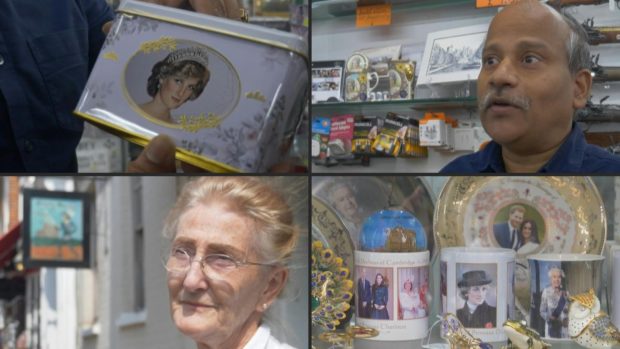
A quarter of a century after Princess Diana’s death, tea cups and tins, thimbles, bells, postcards, silver spoons and even tartans bearing the image of Prince Charles’ first wife are everywhere in Windsor’s souvenir shops, a must-see for fans of the British monarchy. | PHOTO: AFP
WINDSOR — For tourists like Tori McCumiskey visiting Queen Elizabeth II’s hometown of Windsor, Diana remains a royal “icon” who broke through the stuffy palace gates, a quarter-century on from her death.
Standing on the quaint cobbled streets of the town west of London, McCumiskey told AFP that it still gave her “goosebumps” recalling the tragedy, despite the passing of so many years.
The queen has lived in nearby Windsor Castle since the pandemic began, and the town is a must-see for royal fans from around the world.
Diana memorabilia is still hot property, with shops packed full of teacups, tins, thimbles, bells, postcards, silver spoons and even tartan in the likeness of Prince Charles’ first wife.
Everyone in the town remembers where they were on August 31, 1997, when the princess of Wales died at the age of 36 in a Paris car accident.
“I was walking through a shopping mall in Australia and I heard over the loud speakers. I just couldn’t believe it,” recalled McCumiskey.
The 52-year-old Australian, who describes herself as a “staunch royalist”, praised Diana’s ability to connect with people across class divides.
“People saw her as a not quite so stuffy royal, and that she was easily approachable,” she said, proudly remembering that she met the princess at a polo tournament in Melbourne in the 1980s.
‘You can’t forget’
“She is beautiful and she did so many charity works and she is a down-to-earth person,” said Muthucumara Samy Kesavan, manager of Windsor’s House of Gifts souvenir shop.
Situated at the foot of the castle, it sells many items bearing the image of the princess — from magnets to replicas of the invitation card for the 1981 wedding of Charles and Diana, who was then just 20 years old.
Sales “are steady”, he said. “People always ask me for her. She is still very popular.”
Kesavan recalled that he was working at a petrol station in central London the night that Diana died.
“We usually close at night, but here we stayed open because people came to buy flowers. It’s something you can’t forget.”
Aaron Perks, meanwhile, was at a motorbike rally that day.
I “woke up from a heavy night drinking with my friends and it was all over the campsite that she passed away”, said the 55-year-old Englishman, who had come to Windsor with his nieces and nephews.
“And then in every newspaper, in every petrol station we went to on the way home: ‘Diana is dead’.”
Anna Szymnaczak, a 48-year-old Polish woman, confided that she had cried in front of her television watching the coverage.
“She was a normal person, she liked people,” Szymnaczak added.
‘Icon’
In central London, Amelia Irving and her children posed for a photograph in front of a bronze statue of Diana, unveiled last year in the gardens of her former Kensington Palace residence by her sons William and Harry.
It was a rare joint appearance by the now-feuding brothers.
“I wanted to come to London for the Jubilee (in June) but unfortunately I caught Covid just days before,” the 47-year-old American lamented.
“I wanted to see the new statue. I think it’s a good thing they put it here.”
Heike Schuler, a 73-year-old German tourist visiting London for the first time, believes that the Diana phenomenon, burnished by Netflix series “The Crown”, will stand the test of time.
“She brought something new to the monarchy and we’ve never had that again since,” she said.
“She was seen as someone like us. She was beautiful, she was treated badly by the royal family, her death is tragic. You don’t need more to become an icon.”
RELATED STORIES
Princess Diana’s death: Week of grief that shook UK monarchy
Prince Harry suffered ‘total chaos’ over Diana’s death
Princess Diana’s impact endures 20 years after her death
Paris wants a ‘Princess Diana Square’ at site of her death